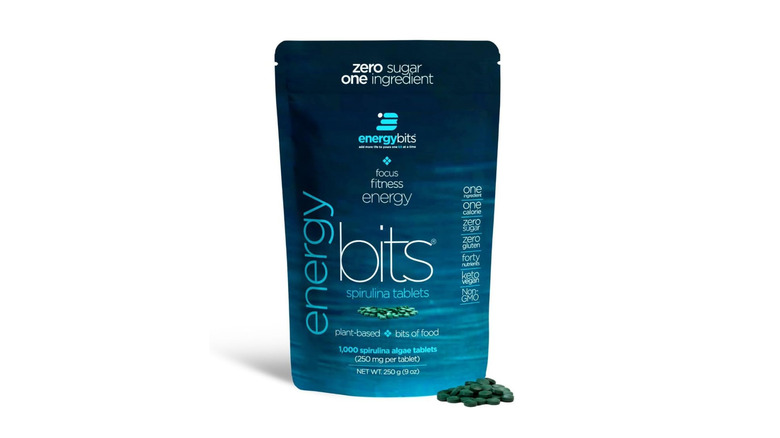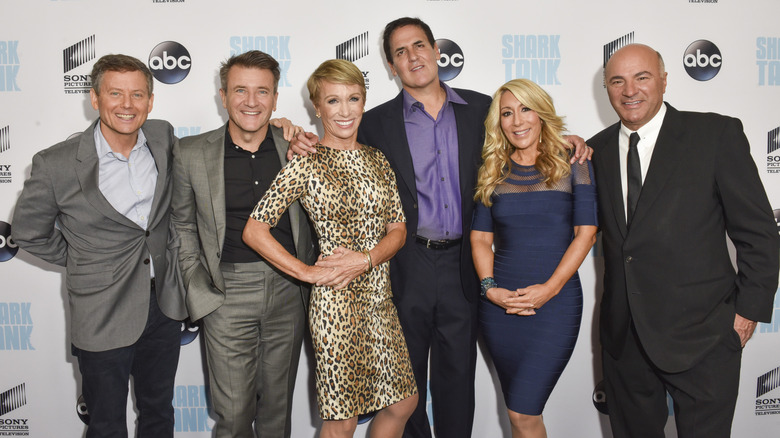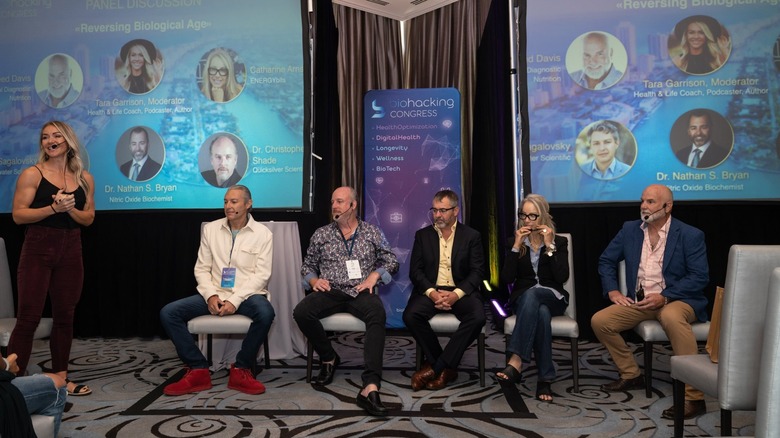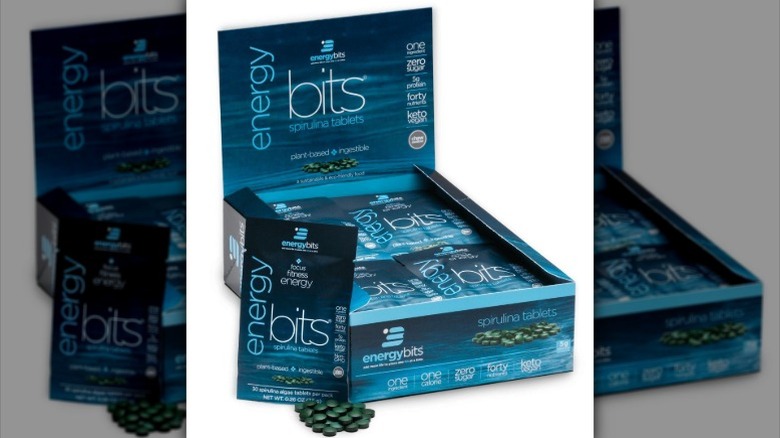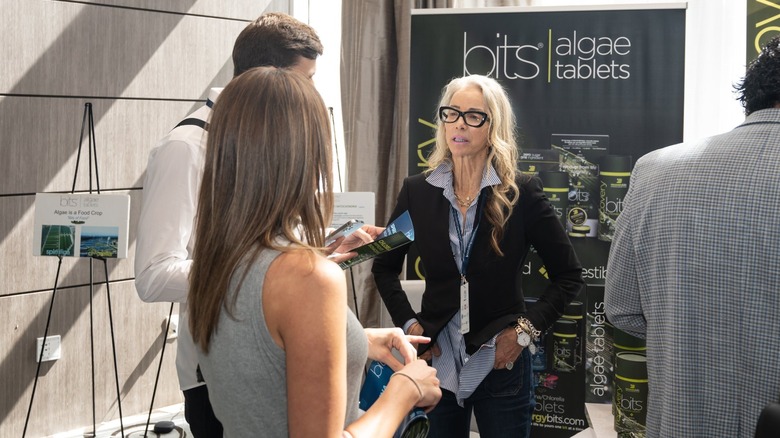Whatever Happened To Energybits From Shark Tank?
We may receive a commission on purchases made from links.
Energybits got its shot on Season 5, Episode 4 of "Shark Tank," where founder Catharine Arnston pitched her algae-based tablets as a natural, plant-based source of energy and nutrition. Marketed as a "one-ingredient" superfood made from either spirulina or chlorella (depending on which product you bought), the tablets were pitched as a cleaner option when compared to traditional energy products and supplements. Arnston entered the tank asking for $500,000 in exchange for 5% equity, and her $10 million valuation seemed to leave the sharks shell shocked.
Arnston explained that the idea came to her after a family member was diagnosed with breast cancer and her doctor recommended adopting a plant-based diet. As she researched nutrient-dense foods, Arnston discovered algae and decided to create a product that made it convenient to consume. She launched Energybits as a direct-to-consumer brand, targeting athletes, wellness professionals, and consumers looking for a whole-food supplement.
Though she arrived to the tank with an in-depth knowledge of the product and its benefits, the Sharks were unconvinced by the valuation and skeptical of its appeal to the average consumer. No deal was made during the pitch, but the show gave Energybits a national platform. In the years since, the company has evolved, expanded its reach, and remained active in the health and wellness space.
What happened to Energybits on Shark Tank?
The product line included spirulina-based ENERGYbits for energy and focus, and chlorella-based RECOVERYbits for detox and immune support. Arnston emphasized that algae had been consumed for decades in other parts of the world, but had yet to break through in mainstream Western markets. Her goal was to change that. During her pitch, Catharine Arnston brought a deep level of knowledge to the table, explaining the nutritional science behind algae and its potential as a whole-food supplement; but she stumbled over her words a bit, possibly because of being nervous. She was confident this was a well-studied superfood that was seriously flying under the radar.
The Sharks, however, weren't buying in. For one, they didn't taste good (not like these delicious no-bake energy balls). The tablets are meant to be swallowed without chewing, but Catharine didn't share that detail upfront, so they automatically honed in on the taste (or flavor, is there a difference?) being awful.
That alone set the stage for the rest of her pitch. Mark Cuban really grilled her with questions about the health claims she was making, inquiring whether other medical professionals were aware of the benefits and asking her to recall any of the 100,000 medical studies she said covered the benefits of chlorella and spirulina. Unfortunately, she didn't sound too sure of herself when placed under scrutiny.
Even though Arnston defended her strategy and the product's effectiveness, the Sharks ultimately passed on the opportunity. Getting a rejection wasn't the end of the road though, as Energybits gained visibility with health-conscious viewers and professionals interested in natural supplements.
Energybits after Shark Tank
I've watched a lot of episodes of "Shark Tank", and it's truly difficult to know when those super specific product are going to be a hit and when they're going to be a flop. One of the cool things about social media is knowing about current trends and what people are gravitating toward at any given moment. Luckily for Catharine and her company, after the episode aired interest in the product increased significantly.
Website traffic spiked and Arnston continued to build her direct-to-consumer strategy. Instead of immediately chasing mass-market retailers, Energybits focused on niche audiences like fitness enthusiasts, biohackers, wellness coaches, and medical professionals; all of whom were more likely to understand and appreciate the science behind algae supplements.
Over time, the company expanded its offerings. Today, the product lineup includes four core products: ENERGYbits and BEAUTYbits are both spirulina-based while RECOVERYbits and VITALITYbits are either chlorella-based or blends. Each is marketed for different health goals — energy, weight management, detoxification, and immune support — and sold in tablet form. The tablets are pressed, not processed, with no added ingredients, a point the company takes pains to emphasize.
That approach appears to have paid off. Even though Energybits never became a mainstream name, it's maintained a steady presence among health-focused consumers. Its e-commerce business continues to serve both individual buyers and wholesale clients, including gyms, spas, and health clinics.
Is Energybits still in business?
Energybits is still in business and has been consistently active since its "Shark Tank" appearance. Based in Boston, the company has stayed independent and continues to focus on educating consumers about all that algae has to offer. The website is regularly updated with blog posts, product guides, and science-backed content. I really like that Arnston explains the difference between spirulina and chlorella, their benefits, and more.
Energybits offers subscriptions, bundles, and samples to make it easier for first-time customers to try the tablets without committing to a full bag. According to the website, the product size ranges from a sample pack to a large box, bag, or canister and you can get the "bits of nutrition" in products ranging from $25 to $150.
What has helped Energybits endure is its tight focus. While other supplement brands have flooded the market with products filled with additives, Energybits has maintained its clean, single-ingredient identity. This has made the brand appealing to customers with dietary restrictions as well as those seeking organic or non-GMO options. The tablets are keto-, vegan-, and paleo-friendly, which resonates with a growing segment of wellness consumers.
Customer reviews frequently highlight benefits like increased energy, improved digestion, and better recovery after workouts. Even with the high price point, many loyal customers return for the quality and transparency that Energybits offers. They also appreciate the founder's continued visibility and engagement with customers. In a crowded industry where many "Shark Tank" companies burn out or sell out, Energybits has taken a slower, more intentional path which appears to be working quite well.
What's next for Energybits?
Energybits has made it clear that its mission isn't just to sell supplements, it's to reframe how people think about algae. Moving forward, the company is doubling down on education, product accessibility, and science-based marketing. Catharine Arnston remains heavily involved as the brand's primary spokesperson. She continues to participate in health conferences and has authored numerous articles to further promote algae as a legitimate superfood.
The company plans to grow through strategic partnerships, including Amazon and some traditional retail stores, albeit few. Its current sales model, which relies on e-commerce and direct partnerships with wellness providers, allows it to stay nimble and maintain product integrity. As far as we know, there are no plans to rebrand or pivot dramatically. Instead, Energybits is expanding into more spaces where algae supplements are welcomed as functional foods.
Energybits continues handing out educational resources to help new customers understand the product. Being so hands-on with your product is certainly commendable. If current trends in plant-based nutrition continue, the brand may find itself even more relevant in the years to come.
